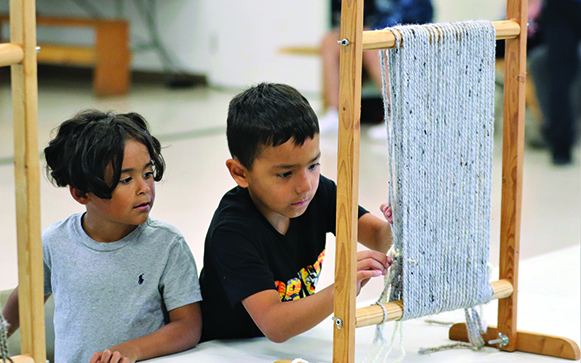
By Micheal Rios, Tulalip News
For two-and-a-half decades, dedicated language warriors of the Lushootseed department have planned, coordinated, and hosted our community’s children in the closest thing we have to a full-on cultural immersion experience. An opportunity for the youngest generation to glimpse the traditional syllables and syntax of their ancestor’s common tongue through everyday phrases, storytelling, and glorious song accompanied by deer hide drum beats.
“Teaching Lushootseed is incredibly beneficial to our youth,” explained Michele Balagot, Lushootseed Manager. “Learning more than one language helps with brain development, which opens their minds to more possibilities.
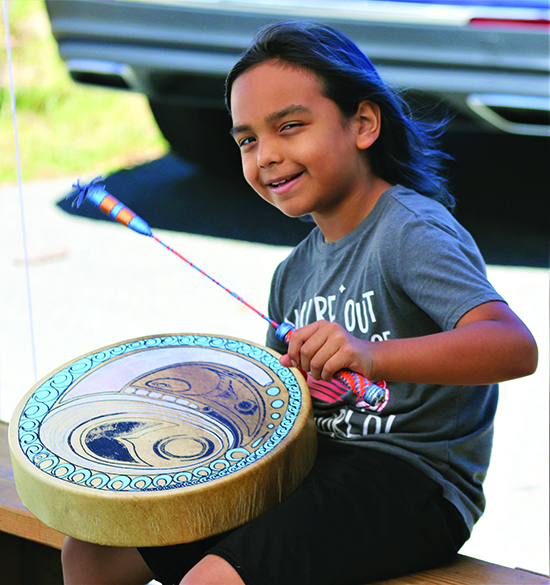
“We know some kids don’t have the opportunity to learn Lushootseed in school, so, for them, our summer camps are the only chance they get to participate in learning the language,” she continued. “No matter the experience level or how ingrained in the culture the children may be, they all make connections and becomes family here. For me, my favorite part of Lushootseed camp is the big play put on Friday. All the parents, grandparents, uncles, and aunts come together to watch their child in the program sing, dance, and act in a play. All in Lushootseed!”
Highly anticipated by both parents and kids alike, this year’s 26th annual Lushootseed day camp was offered in two one-week options. The first occurred between July 10-14, while the second took place the following week July 17-21.
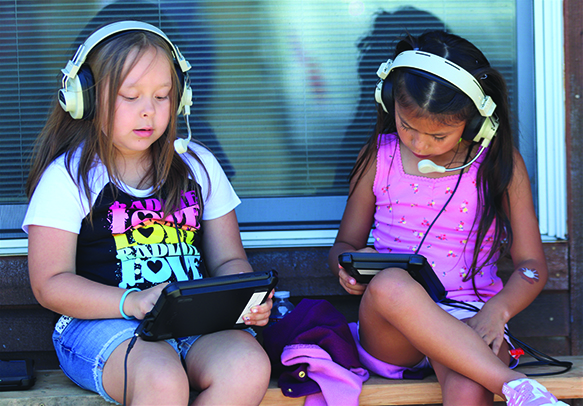
Open to children between the age of five to twelve years old with a desire to learn a little language of their ancestors and a whole lot about their traditional lifeways, Lushootseed Camp provides invaluable cultural immersion through various methodologies. This is achieved by kids cycling through several hands-on workstations each day, such as art, weaving, songs, traditional teachings, games, language, and technology.
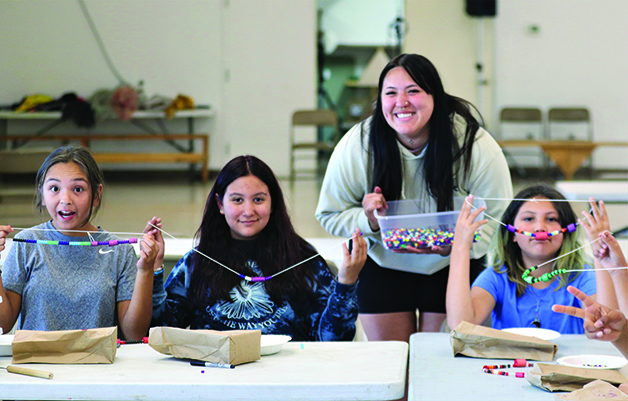
During week one, there were a total of 57 camp participants and 18 group leaders. Week two saw a slight uptick, with a total of 59 participants and 17 group leaders. It’s important to note that nearly all the group leaders, whether teenage or adult, were previous camp kids in their younger years, now older and willing to give back to the summer experience they once enjoyed.
One of those grown-up camp kids includes now Lushootseed teacher assistant Krislyn Parks. She credited long-time Lushootseed teacher Michelle Myles for being a highly impactful, positive influence on her not just at camp over a decade prior, but also at Heritage Highschool. Michelle has instructed a Lushootseed course at Heritage for a few years now. That’s where Krislyn was able to take the course and receive a thorough education on the language of her ancestors. The combination of experiences was so transformative that Krislyn chose to join the Lushootseed department after graduation.
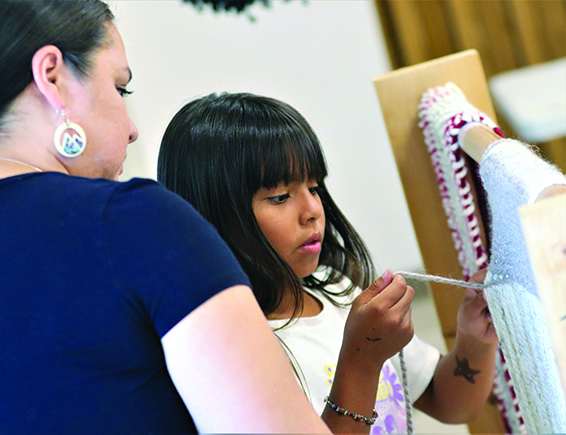
“Seems like only yesterday that I was a Heritage student taking Lushootseed for three years straight, all of it taught by Michelle. She motivated all of us students at the time to embrace our culture, learn our language, and challenged us to implement what we were learning into our daily lives,” recalled Krislyn. “That experience was a big reason why I chose education as my future and what better way to educate our kids than through Lushootseed. Just by learning the language, you can learn all kinds of lessons about what was important to our people back then and what we should probably return to today.”
This year’s camp centered around Tulalip ancestor Elizabeth ‘Lizzie’ Krise’s traditional story titled Deer and Changer. This story takes place long ago. Long before the world was the way it was today and long before humans were a part of it. There were only animal people. When Changer passed through this world to make it ready for humans, some of the animal people were resistant. One such being was Deer, who attempted to stop Changer from making his changes. Ultimately, Deer’s plan fails, and his treachery results in all modern-day deer having dewclaws in their hooves, otherwise thought of as bones in the back of their feet.
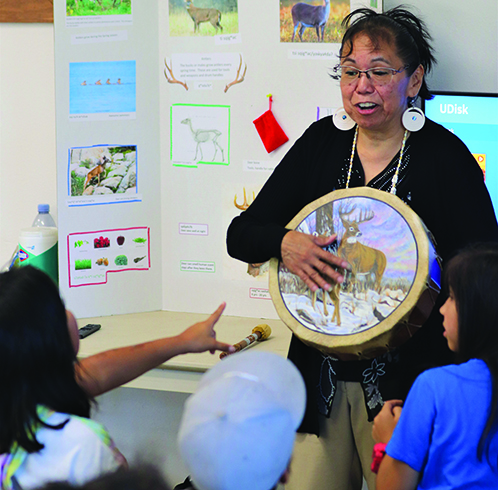
The lessons youth learned daily at the various workstations were based on Lizzie Krise’s story, which tells how deer got extra bones in their feet. This story plot provided ample opportunity to teach the children about Bone Games, which Krislyn was excited to teach the kids how to play as she’d been playing for as long as she could remember.
“It was stressful prepping a workstation that would be enticing for the kids to play and keep their attention, but in the end, it all worked out and was a lot of fun. The best part for me was after teaching them, being able to then step back and watch them play Bone Games with each other,” said Krislyn. Her aunt Carrie Fryberg’s family has played, traveled, and organized Stick Games tournaments for a long time.
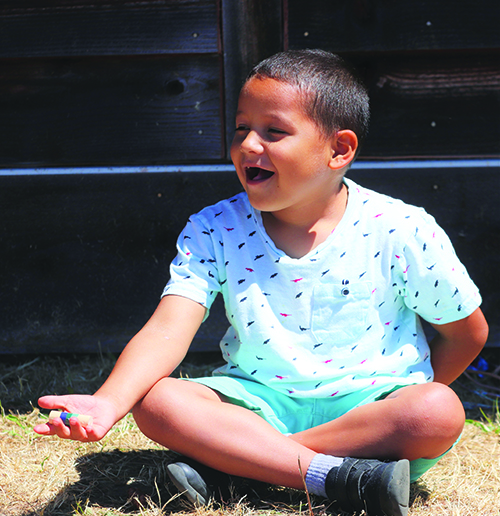
“Having a camp like this, where our kids get to learn about all aspects of their culture, not just ones that their family carry on, is super important,” she added. “We had so many kids admit to not even knowing what Stick or Bone Games are, and now some of those same kids are asking for Tulalip to form a kids’ travel team so they can continue to play against other tribes. That’s pretty cool to witness, in real-time, the transformation that can happen when our kids are given the opportunity to learn their culture.”
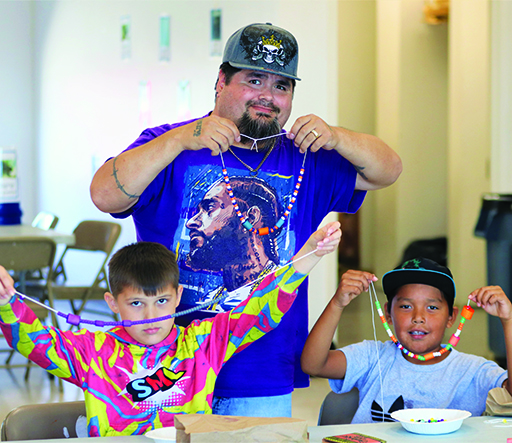
Every camp station and its daily lessons incorporated some kind of traditional teaching and Lushootseed verbiage. Using creative, hands-on activities to keep the energetic youngsters focused, the language warriors made the most of their opportunities to teach the importance of tradition. From vibrant art creations to working together as a community to problem solve, camp kids were learning while having fun.
Using tablets loaded with custom-built software called ACORN (Acquisition of Restored Native Speech), combined with the next generation’s natural predisposition for digital screens, Lushootseed techs Dave Sienko and Brian Barry used digital gaming and videos to teach tradition.
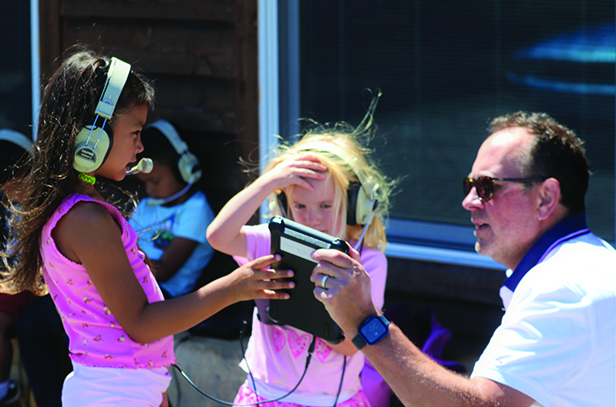
“I’m new here in the Lushootseed department, but found out pretty quick that it operates like an extended family. Everyone is willing to help the next person to reach the desired outcome, whether that’s going out harvesting together or sharing ideas and know-how that help us all perform our work more efficiently,” shared Brian as he pivoted between kids asking for assistance with their tablets. “At the technology station, we had Samsung tablets that were loaded with culture-related games and videos. Through the various age groups, some of them loved to watch previous years’ plays and songs. Some kids didn’t want to watch the play and instead would sit mesmerized by a video showing how to fillet a salmon. That showed me how much the cultural stuff really does resonate with even the youngest of tribal members.”
Both one-week camps culminated with the kids performing their own rendition of Deer and Changer in play form for their loved ones and the greater Tulalip community. Afterward, the ceremonial witnesses shared heartfelt words, followed by camp participants giving away their handmade crafts created during the past week to audience members.